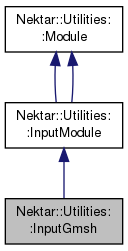|
Nektar++
|
|
Nektar++
|
#include <InputGmsh.h>


Public Member Functions | |
| InputGmsh (MeshSharedPtr m) | |
| Set up InputGmsh object. | |
| virtual | ~InputGmsh () |
| virtual void | Process () |
 Public Member Functions inherited from Nektar::Utilities::InputModule Public Member Functions inherited from Nektar::Utilities::InputModule | |
| InputModule (FieldSharedPtr p_m) | |
| void | AddFile (string fileType, string fileName) |
| InputModule (MeshSharedPtr p_m) | |
| void | OpenStream () |
| Open a file for input. | |
 Public Member Functions inherited from Nektar::Utilities::Module Public Member Functions inherited from Nektar::Utilities::Module | |
| Module (FieldSharedPtr p_f) | |
| virtual void | Process (po::variables_map &vm)=0 |
| void | RegisterConfig (string key, string value) |
| Register a configuration option with a module. | |
| void | PrintConfig () |
| Print out all configuration options for a module. | |
| void | SetDefaults () |
| Sets default configuration options for those which have not been set. | |
| bool | GetRequireEquiSpaced (void) |
| void | SetRequireEquiSpaced (bool pVal) |
| void | EvaluateTriFieldAtEquiSpacedPts (LocalRegions::ExpansionSharedPtr &exp, const Array< OneD, const NekDouble > &infield, Array< OneD, NekDouble > &outfield) |
| Module (MeshSharedPtr p_m) | |
| void | RegisterConfig (string key, string value) |
| void | PrintConfig () |
| void | SetDefaults () |
| MeshSharedPtr | GetMesh () |
| virtual void | ProcessVertices () |
| Extract element vertices. | |
Static Public Member Functions | |
| static ModuleSharedPtr | create (MeshSharedPtr m) |
| Creates an instance of this class. | |
| static std::map< unsigned int, ElmtConfig > | GenElmMap () |
Static Public Attributes | |
| static ModuleKey | className |
| ModuleKey for class. | |
| static std::map< unsigned int, ElmtConfig > | elmMap |
Private Member Functions | |
| int | GetNnodes (unsigned int InputGmshEntity) |
| vector< int > | CreateReordering (unsigned int InputGmshEntity) |
| Create a reordering map for a given element. | |
| vector< int > | TriReordering (ElmtConfig conf) |
| Create a reordering for triangles. | |
| vector< int > | QuadReordering (ElmtConfig conf) |
| Create a reordering for quadrilaterals. | |
| vector< int > | HexReordering (ElmtConfig conf) |
| Create a reordering for hexahedra. | |
| vector< int > | PrismReordering (ElmtConfig conf) |
| Create a reordering for prisms. | |
| vector< int > | TetReordering (ElmtConfig conf) |
| Create a reordering for tetrahedra. | |
Additional Inherited Members | |
 Protected Member Functions inherited from Nektar::Utilities::InputModule Protected Member Functions inherited from Nektar::Utilities::InputModule | |
| void | PrintSummary () |
| Print summary of elements. | |
| void | PrintSummary () |
| Print summary of elements. | |
 Protected Attributes inherited from Nektar::Utilities::InputModule Protected Attributes inherited from Nektar::Utilities::InputModule | |
| set< string > | m_allowedFiles |
| std::ifstream | m_mshFile |
| Input stream. | |
Converter for Gmsh files.
Definition at line 48 of file InputGmsh.h.
| Nektar::Utilities::InputGmsh::InputGmsh | ( | MeshSharedPtr | m | ) |
|
virtual |
Definition at line 167 of file InputGmsh.cpp.
|
inlinestatic |
Creates an instance of this class.
Definition at line 56 of file InputGmsh.h.
|
private |
Create a reordering map for a given element.
Since Gmsh and Nektar++ have different vertex, edge and face orientations, we need to reorder the nodes in a Gmsh MSH file so that they work with the Nektar++ orderings, since this is what is used in the elements defined in the converter.
Definition at line 478 of file InputGmsh.cpp.
References Nektar::LibUtilities::eHexahedron, elmMap, Nektar::LibUtilities::ePrism, Nektar::LibUtilities::eQuadrilateral, Nektar::LibUtilities::eTetrahedron, Nektar::LibUtilities::eTriangle, HexReordering(), Nektar::iterator, PrismReordering(), QuadReordering(), TetReordering(), and TriReordering().
Referenced by Process().
|
static |
Definition at line 957 of file InputGmsh.cpp.
References Nektar::LibUtilities::eHexahedron, Nektar::LibUtilities::ePoint, Nektar::LibUtilities::ePrism, Nektar::LibUtilities::ePyramid, Nektar::LibUtilities::eQuadrilateral, Nektar::LibUtilities::eSegment, Nektar::LibUtilities::eTetrahedron, and Nektar::LibUtilities::eTriangle.
|
private |
For a given msh ID, return the corresponding number of nodes.
Definition at line 420 of file InputGmsh.cpp.
References Nektar::LibUtilities::eHexahedron, elmMap, Nektar::LibUtilities::eNodalTriEvenlySpaced, Nektar::LibUtilities::ePoint, Nektar::LibUtilities::ePrism, Nektar::LibUtilities::ePyramid, Nektar::LibUtilities::eQuadrilateral, Nektar::LibUtilities::eSegment, Nektar::LibUtilities::eTetrahedron, Nektar::LibUtilities::eTriangle, Nektar::Utilities::Point::GetNumNodes(), Nektar::Utilities::Line::GetNumNodes(), Nektar::Utilities::Triangle::GetNumNodes(), Nektar::Utilities::Quadrilateral::GetNumNodes(), Nektar::Utilities::Tetrahedron::GetNumNodes(), Nektar::Utilities::Pyramid::GetNumNodes(), Nektar::Utilities::Prism::GetNumNodes(), Nektar::Utilities::Hexahedron::GetNumNodes(), and Nektar::iterator.
Referenced by Process().
|
private |
Create a reordering for hexahedra.
Definition at line 807 of file InputGmsh.cpp.
References Nektar::StdRegions::eDir1BwdDir1_Dir2FwdDir2, Nektar::StdRegions::eDir1FwdDir1_Dir2FwdDir2, Nektar::StdRegions::eDir1FwdDir2_Dir2FwdDir1, Nektar::Utilities::ElmtConfig::m_faceNodes, Nektar::Utilities::ElmtConfig::m_order, Nektar::Utilities::ElmtConfig::m_volumeNodes, and Nektar::Utilities::quadTensorNodeOrdering().
Referenced by CreateReordering().
|
private |
Create a reordering for prisms.
Note that whilst Gmsh MSH files have the capability to support high-order prisms, presently Gmsh does not seem to be capable of generating higher than second-order prismatic meshes, so most of the following is untested.
Definition at line 732 of file InputGmsh.cpp.
References Nektar::Utilities::ElmtConfig::m_faceNodes, and Nektar::Utilities::ElmtConfig::m_order.
Referenced by CreateReordering().
|
virtual |
Gmsh file contains a list of nodes and their coordinates, along with a list of elements and those nodes which define them. We read in and store the list of nodes in #m_node and store the list of elements in #m_element. Each new element is supplied with a list of entries from #m_node which defines the element. Finally some mesh statistics are printed.
| pFilename | Filename of Gmsh file to read. |
Implements Nektar::Utilities::Module.
Definition at line 182 of file InputGmsh.cpp.
References CreateReordering(), elmMap, Nektar::Utilities::GetElementFactory(), GetNnodes(), Nektar::iterator, Nektar::Utilities::Module::m_mesh, Nektar::Utilities::InputModule::m_mshFile, Nektar::Utilities::InputModule::OpenStream(), Nektar::Utilities::Module::ProcessComposites(), Nektar::Utilities::Module::ProcessEdges(), Nektar::Utilities::Module::ProcessElements(), Nektar::Utilities::Module::ProcessFaces(), Nektar::Utilities::Module::ProcessVertices(), and Nektar::LibUtilities::ShapeTypeMap.
|
private |
Create a reordering for quadrilaterals.
Definition at line 570 of file InputGmsh.cpp.
References Nektar::Utilities::ElmtConfig::m_faceNodes, Nektar::Utilities::ElmtConfig::m_order, and Nektar::Utilities::quadTensorNodeOrdering().
Referenced by CreateReordering().
|
private |
Create a reordering for tetrahedra.
Definition at line 618 of file InputGmsh.cpp.
References Nektar::Utilities::HOTriangle< T >::Align(), Nektar::Utilities::ElmtConfig::m_faceNodes, Nektar::Utilities::ElmtConfig::m_order, Nektar::Utilities::HOTriangle< T >::surfVerts, and Nektar::Utilities::triTensorNodeOrdering().
Referenced by CreateReordering().
|
private |
Create a reordering for triangles.
Definition at line 521 of file InputGmsh.cpp.
References Nektar::Utilities::ElmtConfig::m_faceNodes, Nektar::Utilities::ElmtConfig::m_order, and Nektar::Utilities::triTensorNodeOrdering().
Referenced by CreateReordering().
|
static |
ModuleKey for class.
Definition at line 60 of file InputGmsh.h.
|
static |
Element map; takes a msh id to an ElmtConfig object.
Definition at line 66 of file InputGmsh.h.
Referenced by CreateReordering(), GetNnodes(), Nektar::Utilities::OutputGmsh::OutputGmsh(), and Process().
 1.8.1.2
1.8.1.2